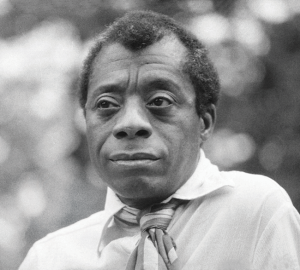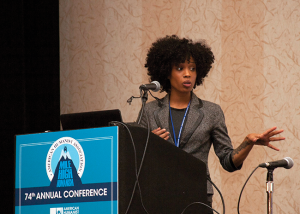Outlaw Humanism Embracing Uncertainty and the Flesh that Struggles to Be Seen
 Photo by Plusquechose | Dreamstime.com
Photo by Plusquechose | Dreamstime.com I’D LIKE TO THANK the American Humanist Association (Maggie Ardiente in particular) and Dr. Anthony B. Pinn for organizing the “Humanism and Race” panel at the 2015 AHA conference in Denver, Colorado, this past spring. I was glad to participate in the discussion of an often difficult, yet timely topic: race and humanism. It’s a topic that is, in my opinion, seldom discussed or confronted within humanist circles—public, civic, institutional, or academic. The following essay is a revised version of my remarks and some extracted pieces of an online essay published at JSTOR Daily (May 2015), titled “Black Death and the Godz of the New Pop Art.”
I want to begin by invoking the great black humanist thinker and writer, James Baldwin, who offered these words in 1965:
One can measure very neatly the white American’s distance from his conscience—from himself—by observing the distance between White America and Black America. One has only to ask oneself who established this distance, who is this distance designed to protect, and from what is this distance designed to offer protection?

James Baldwin (Photo by Allan Warren via Wikimedia Commons)
Baldwin gives us much to think through and ruminate on, especially against the backdrop of our contemporary historical moment: #BlackLivesMatter. As state-sanctioned violence against black and brown people continues and proliferates in the United States, some have argued that the humanist community is often silent and invisible in the unfolding post-civil rights movement, in large part because it is this most affected demographic, people of color, who are often painted as being oppositional to humanism, atheism, and freethought. In fact, the rampant perception that black people in particular are overwhelmingly religious and believe in God is perpetuated by a long history of exaggerated social science data.
Thanks to the work of colleagues such as Norm Allen, Dr. Sikivu Hutchinson, Debbie Goddard, and Dr. Anthony B. Pinn, among others, we know that the African-American community has a long and rich humanist tradition (referred to in a 2012 article in this magazine as the “hidden hues” of humanism). Here, I am thinking about the great works and tomes of thinkers such as James Baldwin, W.E.B. Du Bois, Alice Walker, Langston Hughes, Zora Neal Hurston, and Richard Wright, along with so many others.
I have argued elsewhere that this rich tradition continues today in the form of hip-hop culture and its witty and shape-shifty signifying styling that uses religious rhetoric and theological vocabulary to espouse what I call “outlaw humanism.” Far from the conscious commitment type expressed at typical humanist conferences, outlaw humanism embraces the uncertainty of being, human complexity, and the messiness of life—that is, it offers an effect of humanism, rather than a conscious commitment to humanism. It is one that has been depicted as irrational, illogical, and moving to the tunes of life’s uncertainties, indelibly marked by a so-called faith in the flesh of bodies that struggle to be seen in a world that historically is not designed to see them. Outlaw humanism is much different in form, content, and structure than Enlightenment humanism, with its penchant for secularization that has served as a guiding heuristic and has dominated so much of the discussion on humanism for so long—relegating fragmented black voices, concerns, vocabularies, lives, and interests to the margins of our private and public discourse.
Historically speaking, moments of (possible) social change have produced an anxiety that is often met with increasing violence. In this interpretation, the United States can be seen as a black-death factory, producing dead black men and women by vigilante and law enforcement violence. We then niggerize the victims, their families, and their defenders, effectively criminalizing the dead person, such that the death is validated and repeated. It’s an assembly line preoccupied with whiteness that relies on black workers, and our product is ubiquitous dehumanization.
So, to an intersection of race and humanism—where and when do humanists enter in?
Have you ever tried to convince someone that they should or should not believe in something? There is a similar difficulty associated with convincing a huge number of Americans that they should believe in black humanity. Many can’t see it. There is an ordinariness surrounding black dehumanization that situates black humanity as hidden, elusive, and hard to capture. Even the discourse surrounding the #BlackLivesMatter movement is often treated with an affective apathy akin to what atheists and other nontheists feel when hearing people debate theology. At best, the debate turns into a political problem, treated as bad optics, black noise. If we pay attention to the current slogans from the affected families and communities of the black dead (may we know their names) that rhetorically frame the continuation of #BlackLivesMatter, they speak to a reality that should give those of us in humanist circles pause. They should cause us to reflexively take inventory of what we espouse, where we stand, and who we speak with, to, and on behalf of.
Consider the last words from the lips of Eric Garner—“I can’t breathe”—as officer Daniel Pantaleo held him in a chokehold, juxtaposed with words heard from the body camera video of one deputy, Joseph Byars, spoken to unarmed black suspect Eric Harris before he was shot dead in Tulsa, Oklahoma, by Robert Bates—“Fuck your breath.” The difference between them is striking and cuts to the core of agency, privilege, and marginalization.

Author Monica R. Miller speaks at the AHA’s Annual Conference in Denver, CO on May 9, 2015.
Some of the last words, breaths, and moments of black lives have become unofficial rallying cries against the militarization of the police, and police abuse and bias in the ongoing social unrest and rebellion taking place in some of our most affected communities in the United States. Those who understand black rage and anger call it social movement and those unable to see the full humanity of black bodies as human often refer to this activity in a criminalizing manner—as looting or rioting. Philosopher, postcolonial theorist, psychiatrist, and revolutionary Frantz Fanon reminds us that, “When we revolt it’s not for a particular culture. We revolt simply because, for many reasons, we can no longer breathe.”
Are those with no room to breathe also the ones responsible for doing the work of social change? It seems to me that on the ground in urban spaces of rebellion and social unrest it isn’t humanist organizations on the frontlines. Rather, it is still—so many years after civil rights and black power—black religious, civic, and political institutions, as well as consumers, producers, and artists of the hip-hop community who occupy that front line.
The cultural production of hip hop provides artistic, embodied, and rhetorical manipulations as humanist strategies to humanize those not fully seen in society. These spaces and communities have concerned themselves with human capacity, recognition, and potential. That is, the alchemy of how we can get black bodies from 3/5s human to 5/5s—from Niggas to God (not God in a theological sense, but as the full embodiment of what it means to be human).
Consider these lyrics from Lauryn Hill’s 2012 song, “Black Rage” (sung to the tune of “My Favorite Things,” from Rodgers and Hammerstein’s The Sound of Music), which she updated last summer and dedicated to the murdered Michael Brown:
BLACK RAGE is founded on two-thirds a person
Rapings and beatings and suffering that worsens,
Black human packages tied up in strings.
BLACK RAGE can come from all these kinds of things
BLACK RAGE is founded on blatant denial
Squeezed economics, subsistence survival,
Deafening silence and social control.
BLACK RAGE is founded on wounds in the soul!
When the dog bites
When the beatings
When I’m feeling sad
I simply remember all these kinds of things and then I don’t fear so bad!
Do we humanists see ourselves here in the subject or object of this beautifully haunting protest song; do we find ourselves here—in the rage, denial, or both?
Another hip hop artist, J. Cole, on his track “Be Free” (also dedicated to the slain Michael Browns of the world), sings:
Can you tell me why every time I step outside
I see my niggas die,
Ooh, I’m letting you know
That it ain’t no gun they make that can kill my soul
Oh, no
All we want to do is take the chains off
All we want to do is break the chains off
All we want to do is be free
All we want to do is be free
While our nation struggles to find answers to Cole’s question posed in the first line above, he finds metaphysical solace in the idea that bodies may be destructible, but souls live forever. And while many humanists would debate the theological acrobatics of such an assertion, in such a time of pain where humanity is left to hope against hope, Cole also provides lyrical space to think through the problem beyond the objects and mechanics of terror—that is, to pause and thoughtfully consider the historically long propensity to limit the full humanity of black bodies in America.
We might live in a faith-dominated world—but we also live in a world marked and marred by rampant white supremacy, homophobia, classism, and so many other social ills. What does a public model of humanism that adequately addresses racism and black death look like? Humanists, I argue, must alter their orientation—and interests. In other words, we must get beyond our obsession with deconstructing belief in a god.
Far too many people of color, and marginalized communities more generally—those that “want to take the chains off” and “be free”—know all too well that God ain’t good but these same people and communities also know that humans ain’t better. If you have any doubt about this, consider again Eric Harris’ dying words, “I’m losing my breath,” and Joseph Byars’ response: “Fuck your breath. You shouldn’t have ran.” What does a humanism that gets beyond its position on “gods,” “belief,” “theism,” and “religion” in order to address the mess, social evil, and death that humans have created look like? What do humanists have to say about the “common good” of humanity to those whose lives have been, and continue to be, ravaged and destroyed by lack of the very thing that humanism suggests they turn to for community?
If any of these questions are of deep concern to the humanist communities in which you find yourselves, then perhaps we need to stop chasing the windmills of nonbelief and refocus attention to #livesmattering and what this mattering necessitates and requires of us.
We can learn much and take examples from those who might not know the language and proper vocabulary of humanism but who are living humanism, not so much by choice, but by necessity in bodies that are not yet seen and treated as fully human. What is more humanist than calling yourself into recognition as a whole body, when what the world sees are nobodies or 2/3rds a person? On the question of humanism and race, it seems we have much to learn from those living it on the margins today—often through circumstance, not choice.
